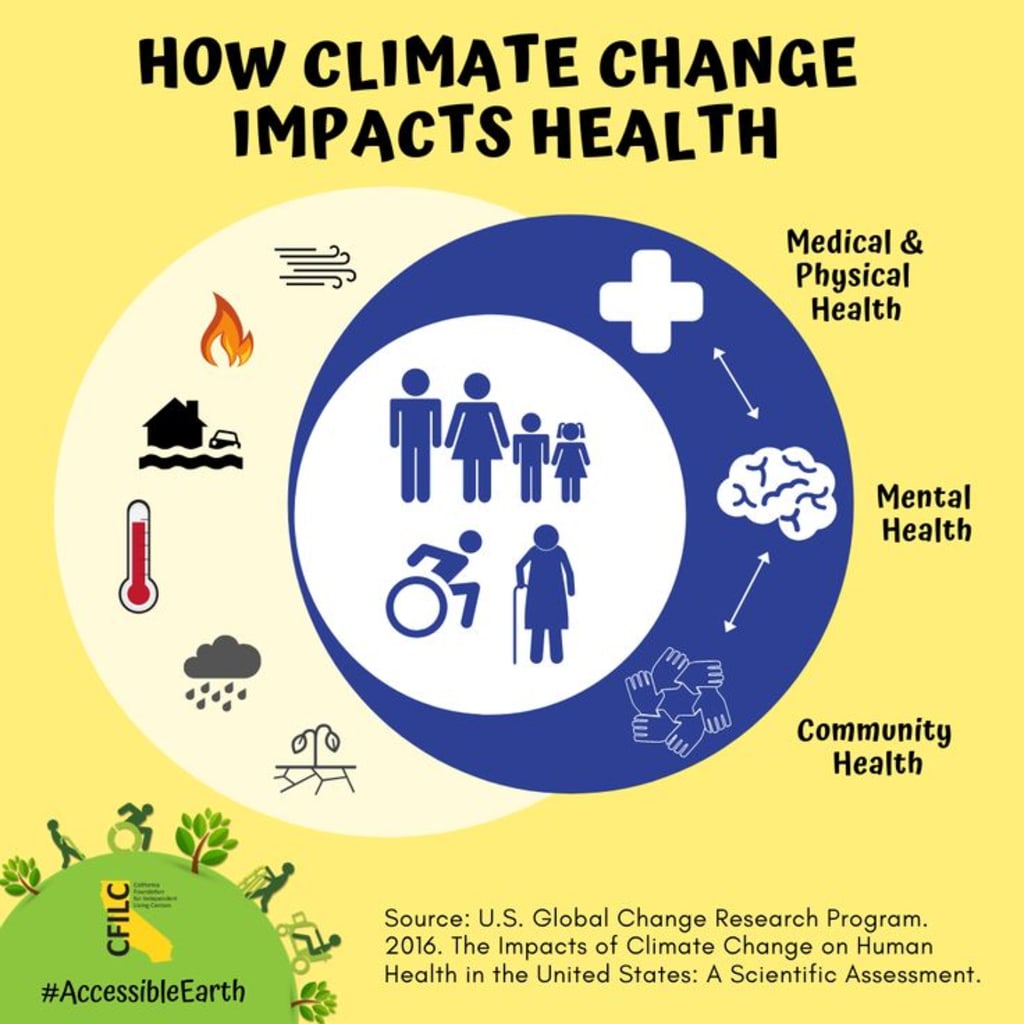The Impact of Climate Change on Global Health.
Health

The Impact of Climate Change on Global Health:
Climate change is one of the most pressing challenges of our time, with far-reaching consequences for the environment, economies, and societies around the world. One of the major areas where the effects of climate change are being increasingly felt is global health. The changing climate patterns and extreme weather events are posing significant threats to human health, both directly and indirectly. This article examines the impact of climate change on global health and highlights the urgent need for concerted action to mitigate and adapt to these challenges.
1. Rising Temperatures and Heatwaves:
As global temperatures continue to rise, heatwaves are becoming more frequent and intense. Heatwaves can have severe health consequences, especially for vulnerable populations such as the elderly, children, and individuals with pre-existing health conditions. Heat-related illnesses, including heatstroke and dehydration, are on the rise, leading to increased hospital admissions and even fatalities. Additionally, higher temperatures can exacerbate respiratory and cardiovascular conditions, leading to a higher burden on healthcare systems.
2. Changing Disease Patterns:
Climate change has the potential to alter the geographic distribution and incidence of infectious diseases. Warmer temperatures and changing rainfall patterns can create favorable conditions for the proliferation of disease vectors, such as mosquitoes and ticks. This has contributed to the spread of vector-borne diseases like malaria, dengue fever, and Lyme disease into new regions. Furthermore, climate change can disrupt ecosystems and increase the risk of zoonotic diseases, as seen with the outbreak of the Zika virus and Ebola virus disease in recent years.
3. Extreme Weather Events:
Climate change is leading to an increase in the frequency and intensity of extreme weather events, including hurricanes, floods, droughts, and wildfires. These events not only cause immediate physical injuries and fatalities but also have long-term impacts on health. Displaced populations are often exposed to unsanitary conditions, leading to the spread of waterborne diseases. Moreover, the destruction of healthcare infrastructure and disruption of essential services further exacerbate health risks in the aftermath of these events.
4. Food and Water Insecurity:
Climate change has the potential to disrupt food production systems and compromise water availability. Rising temperatures and changing precipitation patterns can result in reduced crop yields, food shortages, and increased food prices. This can lead to malnutrition and undernutrition, particularly among vulnerable populations. Additionally, water scarcity and contaminated water sources can contribute to the spread of waterborne diseases, affecting billions of people worldwide.
5. Mental Health Impacts:
The impacts of climate change extend beyond physical health and encompass mental health as well. The loss of homes, livelihoods, and loved ones due to climate-related disasters can result in psychological distress, post-traumatic stress disorder (PTSD), and depression. Furthermore, the constant fear and uncertainty associated with the changing climate and its consequences can contribute to anxiety and other mental health disorders.
6. Disproportionate Impacts on Vulnerable Populations:
It is important to note that the impacts of climate change on health are not equally distributed. Vulnerable populations, including low-income communities, indigenous peoples, and marginalized groups, are disproportionately affected. These communities often lack access to healthcare services, have limited resources to adapt to climate change, and are more likely to live in areas prone to environmental hazards. Addressing health inequalities and ensuring the resilience of these populations is crucial in the face of climate change.
Mitigating and Adapting to Climate Change for Global Health:
To address the impact of climate change on global health, urgent action is required on multiple fronts. Here are some key strategies that can help mitigate and adapt to these challenges:
1. Mitigation: Reducing greenhouse gas emissions through the transition to renewable energy sources, energy efficiency measures, and sustainable transportation can help limit the extent of climate change and its health impacts.
2. Adaptation: Enhancing:
healthcare system resilience and capacity to respond to climate-related health risks is essential. This includes improving surveillance and early warning systems, strengthening healthcare infrastructure, and developing climate-resilient health policies.
3. Public Health Interventions:
Implementing targeted public health interventions can help prevent and control climate-related health risks. This includes promoting heatwave preparedness, vector control measures, and improving access to clean water and sanitation facilities.
4. Education and Awareness:
Raising public awareness about the health impacts of climate change and fostering education on sustainable practices can encourage behavioral changes and support collective action.
5. Collaboration and Policy:
International collaboration and policy frameworks are crucial to effectively address the health impacts of climate change. Cooperation among governments, organizations, and stakeholders can help mobilize resources, share best practices, and develop comprehensive policies.
Conclusion:
The impact of climate change on global health is a growing concern that requires immediate attention and action. Rising temperatures, changing disease patterns, extreme weather events, food and water insecurity, mental health impacts, and the disproportionate burden on vulnerable populations are all urgent issues to address. By implementing mitigation and adaptation measures, investing in public health interventions, raising awareness, and fostering collaboration, we can work towards a healthier and more resilient future in the face of climate change. The time to act is now, for the sake of our planet and the well-being of future generations.





Comments
There are no comments for this story
Be the first to respond and start the conversation.